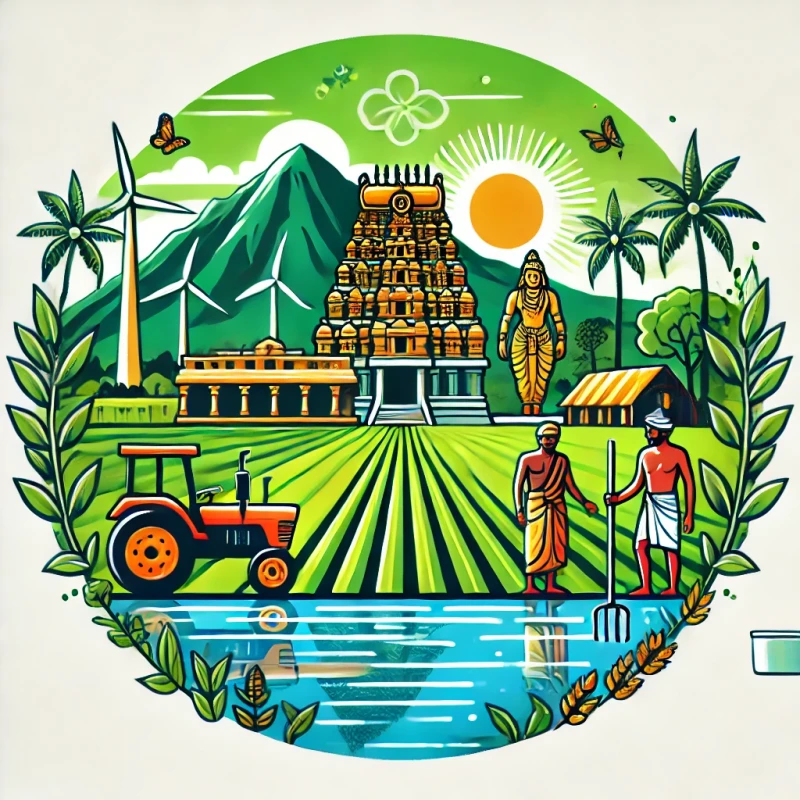- Aug 05, 2024
-
Introduction:
In the picturesque region of Tiruvannamalai, farming isn't just a livelihood—it's a way of life that embraces the natural harmony between the land and its people. As the world increasingly turns towards sustainable living, organic farming in Tiruvannamalai has gained prominence for its eco-friendly practices and commitment to producing healthy, chemical-free food. This blog explores the organic farming practices and farm activities in Tiruvannamalai, highlighting how this region is leading the way in sustainable agriculture.
Summary:
This blog will explore the organic farming landscape in Tiruvannamalai. We'll delve into the traditional and innovative practices used by farmers, the benefits of organic farming, and the various activities that visitors can engage in to experience farm life firsthand. Ready to dive into the green heart of Tiruvannamalai?
The Essence of Organic Farming in Tiruvannamalai
Organic farming in Tiruvannamalai is deeply rooted in the principles of sustainability, biodiversity, and soil health. By avoiding synthetic pesticides and fertilizers, farmers here prioritize natural processes and materials, which leads to healthier crops and a more balanced ecosystem.
Key Organic Farming Practices
1. Crop Rotation and Diversity
Crop rotation is a fundamental practice in organic farming that prevents soil depletion and reduces the risk of pests and diseases. Farmers in Tiruvannamalai grow a variety of crops in a sequential manner, which helps maintain soil fertility and promotes biodiversity.
2. Use of Organic Fertilizers
Organic farmers in Tiruvannamalai rely on natural fertilizers such as compost, green manure, and animal manure. These organic inputs enrich the soil with essential nutrients and improve its structure and water-holding capacity.
3. Integrated Pest Management (IPM)
IPM involves using a combination of biological, cultural, mechanical, and chemical methods to manage pests in an environmentally sustainable way. Farmers utilize natural predators, crop rotation, and physical barriers to keep pest populations under control without relying on harmful chemicals.
4. Water Conservation Techniques
Water is a precious resource, and organic farmers in Tiruvannamalai employ various techniques to conserve it. Drip irrigation, mulching, and rainwater harvesting are common practices that help in efficient water use and reduce wastage.
Engaging Farm Activities in Tiruvannamalai
Visiting an organic farm in Tiruvannamalai offers a unique opportunity to experience sustainable agriculture firsthand. Here are some activities that visitors can participate in:
1. Farm Tours and Educational Workshops
Many organic farms offer guided tours and workshops that educate visitors about organic farming practices, sustainable living, and the importance of biodiversity. These tours often include hands-on activities such as planting, composting, and harvesting.
2. Volunteering Opportunities
For those who want a more immersive experience, volunteering on an organic farm is an excellent option. Volunteers can help with daily farm tasks, learn new skills, and gain a deeper understanding of the challenges and rewards of organic farming.
3. Farm-to-Table Experiences
Visitors can enjoy fresh, organic meals prepared with produce straight from the farm. These farm-to-table experiences often include cooking classes where participants can learn how to prepare healthy, delicious dishes using local ingredients.
4. Yoga and Meditation Retreats
The tranquil environment of Tiruvannamalai's organic farms makes them ideal locations for yoga and meditation retreats. These retreats offer a holistic experience, combining physical wellness with spiritual growth.
5. Nature Walks and Bird Watching
Organic farms in Tiruvannamalai are often home to diverse flora and fauna. Nature walks and bird watching activities allow visitors to connect with the natural beauty of the region and appreciate its ecological richness.
Benefits of Organic Farming
Organic farming offers numerous benefits for the environment, farmers, and consumers:
- Environmental Health: By avoiding synthetic chemicals, organic farming reduces pollution, conserves water, and promotes soil health.
- Biodiversity: Organic farms support a wide range of plant and animal species, enhancing the resilience of ecosystems.
- Healthier Food: Organic produce is free from harmful pesticides and GMOs, making it safer and healthier for consumption.
- Economic Sustainability: Organic farming can be more profitable for farmers in the long run, as it reduces dependency on expensive inputs and improves soil productivity.
Conclusion
Tiruvannamalai's commitment to organic farming reflects a broader movement towards sustainability and environmental stewardship. By embracing traditional wisdom and modern techniques, farmers in this region are nurturing the land and producing healthy, nutritious food. Whether you're a curious traveler, a budding farmer, or someone interested in sustainable living, exploring the organic farms of Tiruvannamalai promises an enriching and educational experience.
Ready to discover the green, sustainable world of organic farming in Tiruvannamalai?



Comments :
Currently, there are no comments in this post. Be the first person to comment on this post.